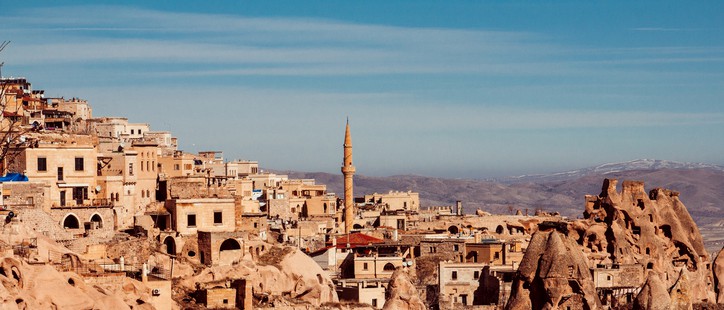Our Opinion: 2017
Turkey : looking eastward?

Turkey has always been the true cross-road between east and west; a brave, outward looking county that deserves a place on the international stage. Since Europe has gone cold on Turkey, it is looking eastward, amplified by an inward-looking EU, and a US whose policies are turned upside down by Donald Trump.
I have spent the first half of my holiday exploring central Anatolia with my family. In Cappadocia, we have seen caves and underground cities where the population hid – often for months – from invading Persian or Arab armies. To enable life to carry on, in near impossible circumstances, they took their life underground – as much as eight levels, and created schools, kitchens and even places for their animals. I’ve rarely seen such an example of resourcefulness and stamina which is so evident in the country’s psyche.
Turkey matters not just for its size, but also as a bellwether of the political forces shaping the world. For centuries, it was the seat of a great empire. Today, as a frontier state, it must cope with the violence spewing out of war-ravaged Syria; it is a test case of whether democracy can be reconciled with political Islam; and it must navigate between Western liberalism and the authoritarian nationalism epitomised by Russia.
In April, Turkey voted in a referendum to abandon their parliamentary system for an executive presidency. There is nothing wrong with a strong president, but Turkey’s new constitution goes too far.
After Mr Erdogan came to power in 2003, he and his AK party did a lot that was good. Encouraged by the IMF, he tamed inflation and ushered in economic growth. Encouraged by the EU, he tackled the cabal of military officers and bureaucrats in the “deep state”, strengthened civil liberties and talked peace with the Kurds. He also spoke up for working-class religious conservatives, who had been locked out of power for decades.
But today Turkey is beset by problems. In the shadow of the Syrian civil war, jihadists and Kurdish militants are waging campaigns against the state. Last summer the army attempted a coup—probably organised by supporters of an American-based cleric, Fethullah Gulen, who had penetrated the bureaucracy, judiciary and army in their tens of thousands. The economy, once a strength, is growing slowly, plagued by cronyism and poor management. Mr Erdogan argued that, to put this right, Turkey needed a new constitution that would generate political stability. He said that only a strong president could galvanise the state and see off its enemies. Naturally, he was talking about himself.
Yet this kind of stability is hollow. The guiding idea of the American constitution is to stop presidents from acting as if they were monarchs, by building in checks and balances – currently proving most valuable. Even the British prime minister, without a written constitution, has to submit herself to the courts, a merciless press and a weekly grilling in Parliament, broadcast live.
Turkey is especially ill-suited to winner-takes-all government. It is divided between secular, religious and nationalist citizens, as well as Turks, Kurds, Alevis and a few remaining Greeks, Armenians and Jews. If the religious-conservative near-majority try to shut out everyone else, just as they were once shut out, Turkey will never be stable.
The state is entitled to protect its citizens, especially in the face of political violence. But Mr Erdogan has gone far beyond what is reasonable. Roughly 50,000 people have been arrested; 100,000 more have been sacked. Only a fraction of them were involved in the coup. Anyone Mr Erdogan sees as a threat is vulnerable: ordinary folk who went to a Gulenist school or saved with a Gulenist bank; academics, journalists and politicians who betray any sympathy for the Kurdish cause; anybody, including children, who mocks the president on social media.
There are reasons to feel positive about the Turkish economy, which is likely to grow by more than 4% this year. Its well-known strengths include stable banks, a youthful population and strong public finances.
However, the administration’s purges against the alleged plotters of last July’s failed coup, and the extended state of emergency rule, are damaging local investor sentiment, as is reflected in increased dollarisation and capital flight. Much needed foreign direct investment may be kept on the side-lines. Knightsbtidge Wealth is assisting Turkish clients looking to manage funds in a secure, well-regulated centre, such as London.
Some in the West will point to Turkey’s experience to claim that Islam and democracy cannot coexist. But to give up on that idea would be to give up on Turkey itself. The outside world should not give up on Turkey, but be patient. As a NATO member and a regional power, Turkey is too important to cut adrift. It will play a vital part in any peace in Syria. Driving it into Russia’s arms makes no sense. Turkey has also been a conduit for refugees into the EU as well as vital in controlling their inflow. The refugee situation is in flux: the EU will need to keep talking to Turkey about how to cope with the resulting instability.
Both sides, with cooler heads, should see the value of defence and counter-terror co-operation, and greater EU engagement with the Kurdish problem. EU entry is off the table. But Brussels should push ahead with a radical upgrade of the customs union with Turkey.
In a while, Turkey will make an appealing investment proposition. In the meantime… I’m back to my holiday.
Alexander Wade
21st August 2017
